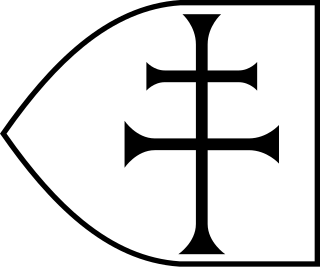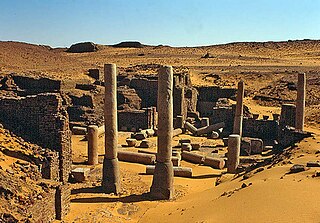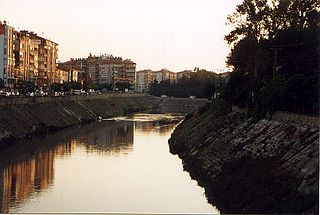Related Research Articles

The 7th century is the period from 601 through 700 in accordance with the Julian calendar in the Christian Era.
The 630s decade ran from January 1, 630, to December 31, 639.
The 650s decade ran from January 1, 650, to December 31, 659.

Year 634 (DCXXXIV) was a common year starting on Saturday of the Julian calendar. The denomination 634 for this year has been used since the early medieval period, when the Anno Domini calendar era became the prevalent method in Europe for naming years.

Year 652 (DCLII) was a leap year starting on Sunday of the Julian calendar. The denomination 652 for this year has been used since the early medieval period, when the Anno Domini calendar era became the prevalent method in Europe for naming years.

Makuria was a medieval Nubian kingdom in what is today northern Sudan and southern Egypt. Its capital was Dongola in the fertile Dongola Reach, and the kingdom is sometimes known by the name of its capital.
The Baqt (بقط) was a 7th-century treaty between the Christian state of Makuria and the new Muslim rulers of Egypt. Lasting almost seven hundred years, it is by some measures the longest-lasting treaty in history. The name comes either from the Egyptian's term for barter, or the Greco-Roman term for pact.

Old Dongola is a deserted town in what is now Northern State, Sudan, located on the east bank of the Nile opposite the Wadi Howar. An important city in medieval Nubia, and the departure point for caravans west to Darfur and Kordofan, from the fourth to the fourteenth century Old Dongola was the capital of the Makurian state. A Polish archaeological team has been excavating the town since 1964.
Georgios II was a ruler of the medieval Nubian kingdom of Makuria. He ascended the throne in 887, after the death of his father Georgios I, and ruled until 915 or 920, when he was succeeded by his son Zacharias II. Belonging to the Dynasty of Zacharias, little is known about his rule, although it is recorded that at some point between 910 and 915, his kingdom was involved in a war with the Abbasid Caliphate.

The Battle of the Iron Bridge was fought between the Muslim Rashidun army and the Byzantine army in 637 AD. The battle took its name from a nearby nine-arch stone bridge spanning the Orontes River which had gates trimmed with iron. It was one of the last battles fought between the Byzantines and Rashidun Caliphate in the province of Syria. The aftermath of the battle marked the nearly complete annexation of the province into the Rashidun Caliphate with the fall of its capital, Antioch.

The Rashidun Caliphate was the first caliphate to succeed the Islamic prophet Muhammad. It was ruled by the first four successive caliphs of Muhammad after his demise in 632 CE. During its existence, the empire was the most powerful economic, cultural, and military force in West Asia and Northeast Africa.
Abū ʿAbd al-Raḥmān ʿAbd Allāh ibn ʿĀmir ibn Kurayz was a Rashidun politician and general, he served as the governor of Basra from 647 to 656 AD during the reign of Rashidun Caliph Uthman ibn Affan. Through his father, he was a cousin of the Caliph. He is renowned for his administrative and military prowess, particularly for his successful campaigns of reconquest and pacification in the former territories of the Sasanian Empire, in what is now present-day Iran and Afghanistan.
The Rashidun army was the core of the Rashidun Caliphate's armed forces during the early Muslim conquests in the 7th century. The army is reported to have maintained a high level of discipline, strategic prowess and organization, granting them successive victories in their various campaigns.
The first battle of Dongola took place between the early Muslim Rashidun army and the Oriental Orthodox Christian Nubians of the Makuria in 642.
The second battle of Dongola or siege of Dongola was a military engagement between early Arab forces of the Rashidun Caliphate and the Nubian-Christian forces of the kingdom of Makuria in 652. The battle ended Muslim expansion into Nubia, establishing trade and a historic peace between the Muslim world and a Christian nation. As a result, Makuria was able to grow into a regional power that would dominate Nubia for over the next 500 years.
The Battle of Dongola may refer to one of a series of military conflicts including:

The Throne Hall of Dongola, also known as the Mosque Building or Mosque of Abdallah ibn Abi Sarh, is an archaeological site in Old Dongola, Sudan. It is a two-storey brick building situated on a rocky hill, overlooking the town and the Nile valley. It was originally built in the 9th century, serving as the richly adorned representative building of the Makurian kings. In 1317, during the period of Makurian decline, it was converted into a mosque, serving this purpose until it was closed and turned into a historic monument in 1969. Shortly afterwards Polish archaeologists from the Polish Centre of Mediterranean Archaeology of the University of Warsaw began to excavate the building. It has been described as possibly "the most important, symbolic edifice in the medieval history of Sudan". It is presently the oldest preserved mosque in Sudan.
The Fourth battle of Dongola or the Second Conquest of Makuria (1287) was fought between the Egyptian Sultanate and the Kingdom of Makuria resulting in a decisive Egyptian victory, capturing the Makurian capital Dongola, forcing the king Samamun to flee and placing a puppet on the Makurian throne.

Slavery in the Rashidun Caliphate refers to the chattel slavery taking place in the Rashidun Caliphate (632–661), a period when the Islamic Caliphate was established and the Islamic conquest expanded outside of the Arabian Peninsula.
References
- ↑ Clark, Desmond J.; Roland Anthony oliver; J.D. Fage; A.D. Roberts (1975). The Cambridge History of Africa Volume 2 c. 500 B.C. - A.D. 1050. Cambridge: Cambridge University Press. p. 847. ISBN 0-521-21592-7.
- ↑ Godlewski, W., Dzierzbicka, D., Łajtar, A. (eds). Dongola 2015–2016. Fieldwork, conservation and site management (=PCMA Excavation Series 5). Warsaw: PCMA, WUW 2018
- ↑ Godlewski, W. Dongola – ancient Tungul archaeological guide p10 https://pcma.uw.edu.pl/wp-content/uploads/template/main/file/Dongola_guide/Dongola_guide_book.pdf